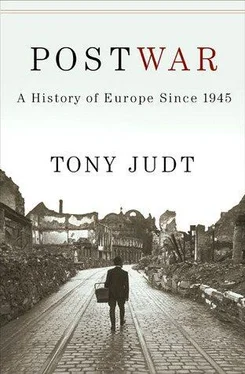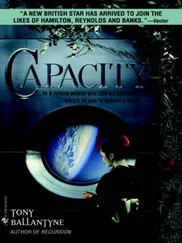Europe is not re-entering its troubled wartime past—on the contrary, it is leaving it. Germany today, like the rest of Europe, is more conscious of its twentieth-century history than at any time in the past fifty years. But this does not mean that it is being drawn back into it. For that history never went away. As this book tries to show, the long shadow of World War Two lay heavy across postwar Europe. It could not, however, be acknowledged in full. Silence over Europe’s recent past was the necessary condition for the construction of a European future. Today—in the wake of painful public debates in almost every other European country—it seems somehow fitting (and in any case unavoidable) that Germans, too, should at last feel able openly to question the canons of well-intentioned official memory. We may not be very comfortable with this; it may not even be a good portent. But it is a kind of closure. Sixty years after Hitler’s death, his war and its consequences are entering history. Postwar in Europe lasted a very long time, but it is finally coming to a close.
PART ONE
Post-War: 1945-1953
‘This was no slow decadence that came to the Europeanised world—other civilizations rolled and crumbled down, the European civilization was, as it were, blown up’.
H.G. Wells,
War in the Air (1908)
‘The human problem the war will leave behind it has not yet been imagined, much less faced by anybody. There has never been such destruction, such disintegration of the structure of life’.
Anne O’Hare McCormick
‘Everywhere there is a craving for miracles and cures. The war has pushed the Neapolitans back into the Middle Ages’.
Norman Lewis,
Naples ’44
Europe in the aftermath of the Second World War offered a prospect of utter misery and desolation. Photographs and documentary films of the time show pitiful streams of helpless civilians trekking through a blasted landscape of broken cities and barren fields. Orphaned children wander forlornly past groups of worn out women picking over heaps of masonry. Shaven-headed deportees and concentration camp inmates in striped pyjamas stare listlessly at the camera, starving and diseased. Even the trams, propelled uncertainly along damaged tracks by intermittently available electric current, appear shell-shocked. Everyone and everything—with the notable exception of the well-fed Allied occupation forces—seems worn out, without resources, exhausted.
This image will need to be nuanced if we are to understand how that same shattered continent was able to recover so rapidly in years to come. But it conveys an essential truth about the European condition in the wake of Germany’s defeat. Europeans felt hopeless, they were exhausted—and for good reason. The European war that began with Hitler’s invasion of Poland in September 1939 and ended with Germany’s unconditional surrender in May 1945 was a total war. It embraced civilians as well as soldiers.
Indeed, in those countries occupied by Nazi Germany, from France to the Ukraine, from Norway to Greece, World War Two was primarily a civilian experience. Formal military combat was confined to the beginning and end of the conflict. In between, this was a war of occupation, of repression, of exploitation and extermination, in which soldiers, storm-troopers and policemen disposed of the daily lives and very existence of tens of millions of imprisoned peoples. In some countries the occupation lasted most of the war; everywhere it brought fear and deprivation.
Unlike World War One, then, the Second War—Hitler’s War—was a near-universal experience. And it lasted a long time—nearly six years for those countries (Britain, Germany) that were engaged in it from beginning to end. In Czechoslovakia it began earlier still, with the Nazi occupation of the Sudetenland in October 1938. In eastern Europe and the Balkans it did not even end with the defeat of Hitler, since occupation (by the Soviet army) and civil war continued long after the dismemberment of Germany.
Wars of occupation were not unknown in Europe, of course. Far from it. Folk memories of the Thirty Years War in seventeenth-century Germany, during which foreign mercenary armies lived off the land and terrorized the local population, were still preserved three centuries later, in local myths and in fairy tales. Well into the nineteen-thirties Spanish grandmothers were chastening wayward children with the threat of Napoleon. But there was a peculiar intensity to the experience of occupation in World War Two. In part this was because of the distinctive Nazi attitude towards subject populations.
Previous occupying armies—the Swedes in seventeenth-century Germany, the Prussians in France after 1815—lived off the land and assaulted and killed local civilians on an occasional and even random basis. But the peoples who fell under German rule after 1939 were either put to the service of the Reich or else were scheduled for destruction. For Europeans this was a new experience. Overseas, in their colonies, European states had habitually indentured or enslaved indigenous populations for their own benefit. They had not been above the use of torture, mutilation or mass murder to coerce their victims into obedience. But since the eighteenth century these practices were largely unknown among Europeans themselves, at least west of the Bug and Prut rivers.
It was in the Second World War, then, that the full force of the modern European state was mobilized for the first time, for the primary purpose of conquering and exploiting other Europeans. In order to fight and win the war, the British exploited and ransacked their own resources: by the end of the war, Great Britain was spending more than half its Gross National Product on the war effort. Nazi Germany, however, fought the war—especially in its latter years—with significant help from the ransacked economies of its victims (much as Napoleon had done after 1805, but with incomparably greater efficiency). Norway, the Netherlands, Belgium, Bohemia-Moravia and, especially, France made significant involuntary contributions to the German war effort. Their mines, factories, farms and railways were directed to servicing German requirements and their populations were obliged to work at German war production: at first in their own countries, later on in Germany itself. In September 1944 there were 7,487,000 foreigners in Germany, most of them there against their will, and they constituted 21 percent of the country’s labour force.
Axis-Occupied Europe: November 1942

The Nazis lived for as long as they could off the wealth of their victims—so successfully in fact that it was not until 1944 that German civilians themselves began to feel the impact of wartime restrictions and shortages. By then, however, the military conflict was closing in on them, first through Allied bombing campaigns, then with the simultaneous advance of Allied armies from east and west. And it was in this final year of the war, during the relatively brief period of active campaigning west of the Soviet Union, that much of the worst physical destruction took place.
From the point of view of contemporaries the war’s impact was measured not in terms of industrial profit and loss, or the net value of national assets in 1945 when compared to 1938, but rather in the visible damage to their immediate environment and their communities. It is with these that we must begin if we are to understand the trauma that lay behind the images of desolation and hopelessness that caught the attention of observers in 1945.
Читать дальше













